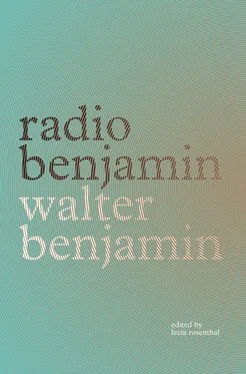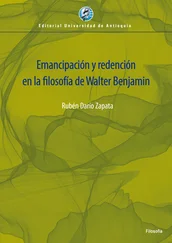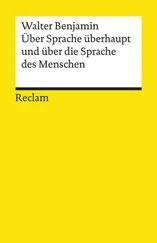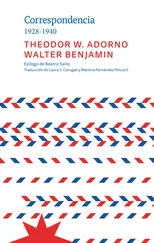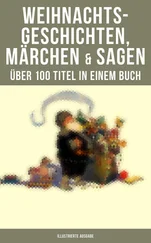Don’t worry that you’ve never heard the name Ludwig Rellstab. And whatever you do, don’t ask your parents; they’ve never heard of him either, and they won’t have a clue what to say. This Rellstab is not a famous man. Or rather, to be more precise, in his time he was one of the best-known people in Berlin. The short of it is, little remains of him. Today he is not even known for his greatest accomplishment: his autobiography, parts of which I’ll read to you later.
That this autobiography should be so beautiful without there being too much of any importance to say about its author isn’t all that surprising. For it is not always the most famous or gifted people who retain the profoundest love and memories of their childhood. Moreover, this is rarer for a city dweller than for someone who has grown up in the countryside. It’s hardly common for a child to forge such harmonious and happy connections with a large city so that later, as a mature man, it’s a joy for him to recall his boyhood memories. Rellstab knew this joy; you can sense it throughout the book, even if he never explicitly says that his childhood was a particularly happy one.
Now let’s dive right into the story. What do you say to the fact that his father “took a house in the country with his family every summer”? 2And where do think it was? Right there in the Tiergarten. Let’s let Rellstab himself tell us how the Tiergarten looked at a time when you could take a summer vacation there:
As far back as I can remember, I see myself in summer in the green of the Tiergarten, which back then had a more rustic character than it does now. It remains the most beautiful setting of my earliest memories, as well as of those that would come much later. In those days it was even more suited to playing than it is now. The woods provided large areas where everything was left to become overgrown. Except for the road to Charlottenburg, there wasn’t a single paved way, only deep sandy paths that crossed the terrain. So there were relatively few wagons even in the larger avenues, and they moved slowly and with difficulty. When I look at the Tiergarten now, I can hardly believe that it once housed genuine wilderness, where raspberry bushes grew between thickets on the moist meadows, and their bountiful fruits would quietly ripen for us, the inhabitants. The strawberries also provided abundant harvest. To us everything seemed far removed from people, and as lonely as a primeval forest. We literally took it over. Each playmate claimed his own rightful plot. We carved out lawns, made rustic lodgings from the dense thickets, and wedged small boards in trees to sit between branches; we even made a border out of little pickets stuck in the ground like a garden fence. All told, we ruled over our lots as if they were our very own. We could go for weeks without visiting our little wilderness colony, but when we did return, nothing was disturbed, so solitary was the forest back then. Today it has been transformed into a garden, terribly noisy and overrun with people. 3
Thus did an old Berliner describe the Tiergarten of 1815. I find this description very beautiful. But now, time for an inlay. I would like to show you how a friend of mine, born eighty years after Rellstab, described his Tiergarten childhood. And, despite the differences, this description shows that the true Berliner never stops loving it. This new true Berliner is my friend Franz Hessel, who writes in Spazieren in Berlin [On Foot in Berlin]:
In the waning twilight it is still as rough and disorienting today as it was thirty or forty years ago, before the last Kaiser had the nature park transformed into a more open and respectable place. While his orders to clear the undergrowth, widen many of the paths, and improve the lawns are certainly commendable, much of the Tiergarten’s beauty has been lost: its charming disorder, branches crackling underfoot, the rustling of leaves along neglected narrow paths. However, he left a few wild spots that managed to survive into the days of our childhood. What I remember most from this time are the tiny sloped footbridges spanning the streams, which were sometimes presided over by vigilant bronze lions, holding in their jaws the chains that served as guard rails. 4
Hessel goes on to describe the entire Tiergarten up to where it borders the Cornelius Bridge. If we had more time, there would be so much more to say, for example, about this bridge that still today clings to its private, almost rustic appearance. This formerly seldom used and rather isolated bridge now funnels all the city’s automobile traffic as it spills toward the west. If you think about it, this bridge’s fate is as remarkable as that of many men.
But now back to Rellstab. In the whole of his tale of youth, there’s one thing he complains about repeatedly and never seems to have completely got over: the music lessons forced upon him by his father. These after-school lessons were the worst part of his day. He relates how unhappy he was that they forced him to forgo the games and antics his schoolmates would use to prolong the way home from school. Many of these games were rather curious, and we hear about how they were already being diligently prepared during class. “For some time,” says Rellstab,
it was our habit, while still in school during our last class, to make little boats out of paper and bark, and then, and this was especially entertaining after a strong rain, to let them float down the gutter until they vanished at the corner of Mohrenstraße and Markgrafenstraße, where the runoff feeds into an underground canal. There was nothing more interesting than following the routes of our little boats; we held our breath watching as they disappeared into a little drain tunnel and greeted them with joy as they reemerged on the other side. I had the hardest time tearing myself away in order to head home along my solitary path to my piano lessons. 5
You can imagine that it was no easier for him to leave when “Zillrad” was the game of the day. But what was this inexpressibly magical game, as he calls it? Thank goodness he explains it to us; otherwise we might wonder forever and never find out. Here’s how it works. A bunch of boys — the more the merrier — would climb atop an empty hay wagon, a common sight in the streets back then. One boy, chosen by counting out a rhyme, would run around the wagon trying to tag the feet of the boys above. Whoever was tagged then had to climb down and give it a go himself. 6
Rellstab’s father must have been a very peculiar man. He was an editor of the Vossische Zeitung. 7 One evening he was supposed to attend a magic show and then write about it for the newspaper. Having no desire to go and a very busy schedule, he sent his son, who was just twelve years old at the time. When he got home, he had him write down his impressions. Then he fixed the article up a bit and sent it on to the Vossische Zeitung. This was Rellstab’s first published work. But the visit had a curious effect. After the show the magician explained a few of his tricks to those who had waited around the theater. The young Rellstab heard these explanations and for weeks could think of nothing but magic. He managed to find a shop in Berlin that sold magic supplies, contraptions with secret mechanisms, boxes with double bottoms, playing cards with hidden marks. He also searched out any book that would help him study magic as a science.
Nothing much came of this, he admits. But who knows whether he wouldn’t have become a famous magician if back then he had had the splendid book which, as our second inlay, I’d like to tell you about now. Despite technology, cars, electric generators, radio, etc., it seems that many children are still interested in magic. True, the golden age of magic has passed. There was a time when, every summer in all the big seaside resorts, world-famous magicians, the likes of Bellachini or Houdini, performed before packed houses. Just now a book has finally appeared in which all kinds of magic, including hundreds of tricks and some of the most incredible and astounding things you could ever imagine, are depicted and explained in clear detail. It’s called Das Wunderbuch der Zauberkunst [The Wonder Book of Magic] and was written by Ottokar Fischer, who calls himself “a formerly practicing artist and director of the Kratky-Baschik Magic Theater in Vienna.” 8One glance at the table of contents and your eyes are popping at the abundance of magic on offer. And don’t worry that knowing what’s behind the tricks could stop you from enjoying magic shows. To the contrary, only when you know to watch very closely, and no longer let yourself get caught up in the magician’s clever patter, always keeping an eye on what’s coming next — only then will you appreciate the magician’s unbelievable skill and recognize that it is his speed, the result of so much practice and determination, that is oftentimes behind the sorcery. Another time soon we’ll speak more about magic, so I’ll say nothing more today other than to list a few headings from our book: The Bottomless Punchbowl — The Devil’s Target — The Queen of the Air — Schiller’s Bell — The Indestructible Cord — The Swami Seer’s Wristwatch — Ladies Scorched, Perforated and Cut in Half — The Wonder of Ben Ali Bey — The Disappearance of Twelve Members of the Audience — and many more.
Читать дальше
